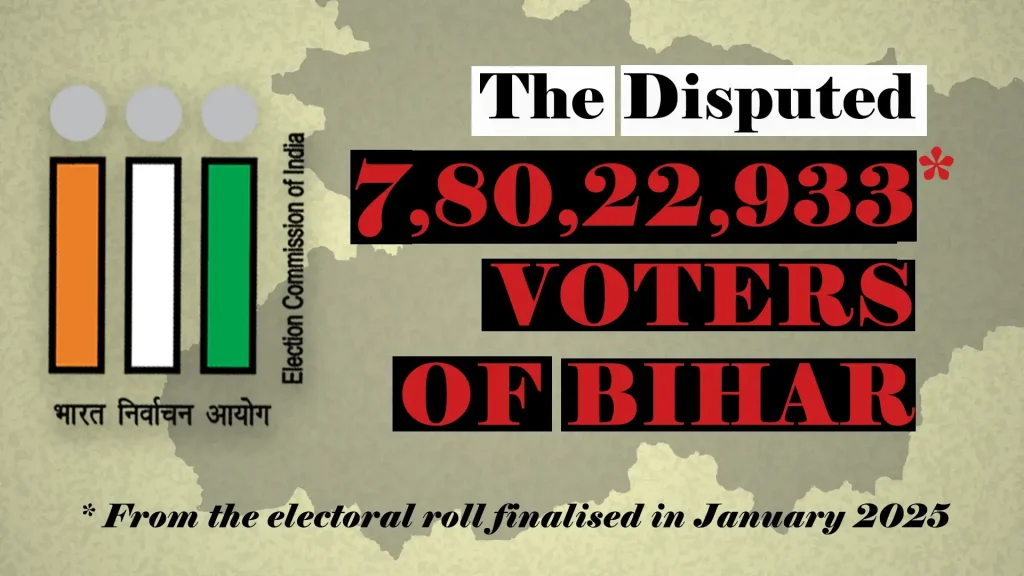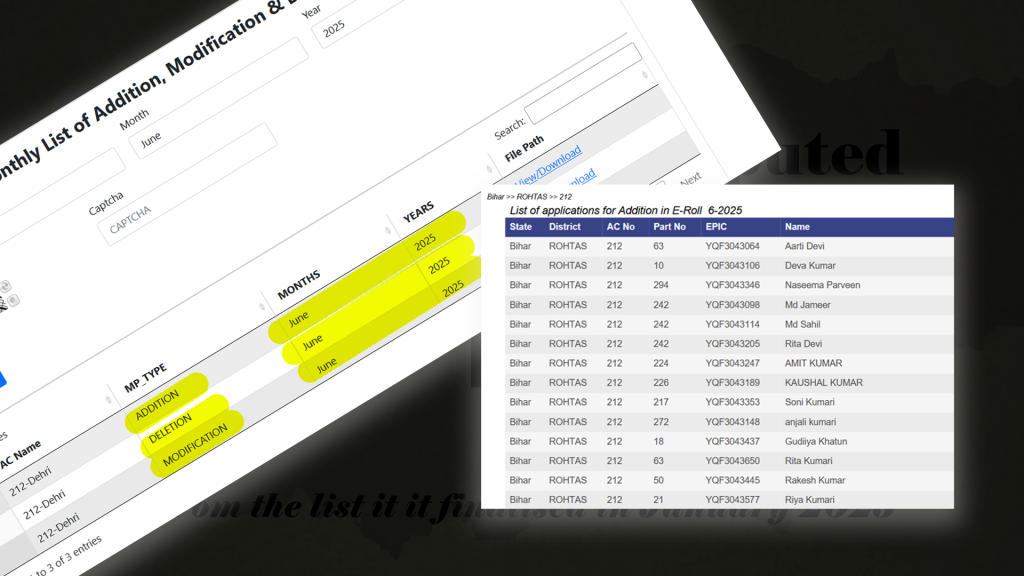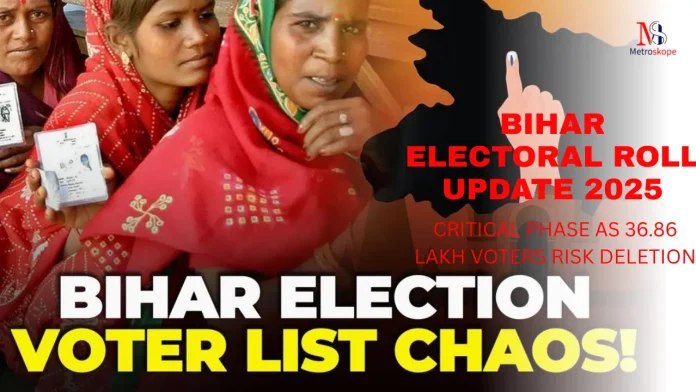Bihar’s ambitious electoral roll cleansing exercise is approaching its final phase with significant implications for millions of voters.
The Special Intensive Revision (SIR) ordered by the Election Commission of India on June 24, 2025, has reached a critical juncture with only six days remaining for form submission and approximately 5% work still pending.
This comprehensive voter verification drive could potentially result in the deletion of 36.86 lakh voters from Bihar’s electoral rolls.
Current Status of Special Intensive Revision
Progress Overview
As of the latest updates, Bihar’s SIR has achieved remarkable progress in its voter verification mission.
The Election Commission has successfully collected over 7.48 crore enumeration forms, representing 94.68% of the total target.
Out of Bihar’s 7.9 crore registered voters, the comprehensive door-to-door verification process has covered the vast majority of the electorate.
The enumeration process has been facilitated by 77,895 Booth Level Officers (BLOs) conducting house-to-house visits, supported by an additional 20,603 BLOs appointed to ensure timely completion.

Nearly 4 lakh volunteers, including government officials, NCC cadets, and NSS members, are actively working in the field to assist elderly, disabled, and vulnerable populations.
Digital Infrastructure Success
The ECINet platform has emerged as a crucial tool in this massive exercise, with over 6.20 crore enumeration forms successfully uploaded. The digital platform allows voters to:
- Fill enumeration forms online using mobile phones
- Search their names in the 2003 electoral roll database
- Connect directly with election officials and BLOs
- Check submission status through the new module launched on the voters portal
The Challenge of Missing Voters
35.7 Lakh Voters Untraceable
One of the most significant challenges facing the SIR process is the 35.7 lakh electors (4.5% of Bihar’s total electorate) who could not be found at their recorded addresses despite BLOs completing their mandatory three visits.
This substantial number breaks down into several categories:
- 12.5 lakh electors who are probably deceased (1.6%)
- 17.4 lakh electors who have probably permanently shifted (2.2%)
- 5.8 lakh electors enrolled at multiple places (0.7%)
Political Party Verification Process
To address this challenge, the Election Commission has initiated a collaborative verification process with political parties.
Starting from July 17, the EC began sharing detailed data with district presidents and 1.5 lakh booth level agents of various political parties.
This collaborative approach aims to confirm the exact status of missing electors by July 25, 2025 – the final submission deadline.
Timeline and Key Deadlines

Critical Dates for Voters
The SIR process follows a strict timeline that voters must be aware of:
- June 24, 2025: Election Commission orders SIR
- June 25, 2025: Process officially begins
- July 25, 2025: Final deadline for enumeration form submission
- August 1, 2025: Draft electoral roll publication
Remaining Time Frame
With only six days remaining until the July 25 deadline, the Election Commission has intensified its outreach efforts.
Special camps have been established in all 5,683 wards of Bihar’s 261 Urban Local Bodies to ensure maximum voter participation.
Document Requirements and Flexibility
Relaxed Documentation Rules
In a significant development, the Election Commission has eased documentation requirements to ensure broader participation. The key changes include:
- Forms can be submitted without complete documentation
- Required documents can be submitted later during the claims and objection period
- All voters who submit forms (with or without complete documentation) will be included in the draft electoral roll
- Documents can be added during the subsequent verification phase
Accepted Documents
The Supreme Court has also directed the Election Commission to consider additional documents for voter verification, including:
- Aadhaar cards
- EPIC (Elector’s Photo Identity Cards)
- Ration cards
This is in addition to the eleven documents already notified by the Commission.
State-wise Implications and National Rollout
Bihar as Pilot State
Bihar serves as the pilot state for this comprehensive electoral roll revision, with the Election Commission planning a nationwide rollout.
On July 5, 2025, the EC directed Chief Electoral Officers of all other states to begin preparations for similar exercises.
The qualifying date for the national exercise has been set as January 1, 2026, indicating the Commission’s commitment to comprehensive electoral roll cleansing across India.
Historical Context
This marks the first intensive revision of Bihar’s electoral rolls since 2003.
The 2003 electoral roll serves as the baseline for probative evidence of eligibility, meaning voters listed in that year are presumed to be Indian citizens unless proven otherwise.
Legal Challenges and Supreme Court Intervention
Constitutional Scrutiny
The SIR process has faced legal challenges, with Association for Democratic Reforms and other petitioners approaching the Supreme Court.
However, on July 10, 2025, the Supreme Court refused to halt the ongoing revision.
The Supreme Court bench, comprising Justices Sudhanshu Dhulia and Joymalya Bagchi, observed that the matter required further consideration while allowing the process to continue. The court has scheduled the next hearing for July 28, 2025.
Transparency Measures
To enhance transparency while maintaining voter privacy, the Election Commission has committed to uploading verification documents on the ECINet platform.
These documents will be accessible only to authorized election officials, ensuring both transparency and security.
Ground Reality and Implementation Challenges
Field-Level Flexibility
Recent investigations reveal that Booth Level Officers are exercising considerable discretion in accepting enumeration forms.
In areas like Hajipur and Muzaffarpur, BLOs are accepting forms without supporting documents, relying on their judgment and local knowledge.
This flexibility, while potentially increasing inclusion rates, has raised questions about standardization and consistency across different constituencies and districts.
Voter Response and Participation
Despite initial concerns and confusion, voter response has been overwhelmingly positive. Chief Election Commissioner Gyanesh Kumar has praised the active participation of Bihar’s electorate in this crucial exercise.
The Commission has particularly commended the digital adoption among voters, with many successfully using the ECINet app and online portal to submit their forms independently.
Impact on Upcoming Elections
Electoral Integrity
The SIR exercise aims to ensure electoral integrity by:
- Including every eligible citizen without exclusion
- Removing ineligible voters from the rolls
- Eliminating deceased, shifted, and duplicate entries
- Preventing illegal immigrant participation
Voter Turnout Implications
The comprehensive nature of this revision could significantly impact voter turnout in the upcoming Bihar Assembly Elections 2025.
A cleaner electoral roll typically leads to more accurate turnout percentages and reduces disputes over voter eligibility.
Technology Integration and Innovation
Mobile-First Approach
The Election Commission has adopted a mobile-first strategy for this revision, recognizing the widespread adoption of smartphones in Bihar. The ECINet mobile application has become the primary tool for voter interaction, offering:
- Instant form submission capabilities
- Real-time status tracking
- Direct communication with election officials
- Document upload functionality
Data Processing Capabilities
The massive scale of data processing – involving nearly 7.9 crore voters – demonstrates the Election Commission’s enhanced technological capabilities. The system can handle:
- Simultaneous form submissions from millions of users
- Real-time data verification and processing
- Duplicate detection across multiple databases
- Geographic mapping of voter locations
Administrative Coordination
Multi-Level Implementation
The SIR process involves coordination across multiple administrative levels:
- 38 District Election Officers overseeing district-level operations
- 239 Electoral Registration Officers covering all 243 Assembly Constituencies
- 963 Assistant Electoral Registration Officers providing field-level support
- 1.55 lakh Booth Level Agents appointed by political parties
Resource Mobilization
The sheer scale of human resources mobilized for this exercise is unprecedented:
- Nearly 100,000 BLOs conducting door-to-door verification
- 4 lakh volunteers providing community support
- Government officials at all levels participating in the process
- Political party workers assisting in verification
Challenges and Concerns

Time Constraints
With only 6 days remaining for form submission, time pressure has become a critical factor. The Election Commission faces the challenge of:
- Reaching remaining 5% of voters who haven’t submitted forms
- Processing last-minute submissions efficiently
- Ensuring data quality despite time pressures
- Maintaining verification standards while meeting deadlines
Rural-Urban Divide
The implementation reveals distinct challenges across different geographic areas:
- Urban areas show higher digital adoption and online submission rates
- Rural constituencies rely more heavily on BLO visits and physical form submission
- Remote locations face connectivity and access challenges
- Migrant populations present unique verification difficulties
Future Implications and Lessons
National Template
Bihar’s SIR experience is likely to serve as a template for the national rollout planned for 2026. Key lessons include:
- Importance of digital infrastructure in managing large-scale operations
- Need for flexible documentation requirements to ensure inclusion
- Value of political party collaboration in verification processes
- Critical role of community volunteers in reaching vulnerable populations
Democratic Strengthening
The comprehensive nature of this revision represents a significant step toward strengthening democratic processes in India. By ensuring accurate electoral rolls, the exercise contributes to:
- Enhanced election credibility
- Reduced electoral disputes
- Improved governance legitimacy
- Stronger democratic institutions
Bihar’s Special Intensive Revision stands at a crucial juncture with six days remaining for completion.
The exercise has already achieved remarkable success in collecting 94.68% of enumeration forms, but the challenge of 36.86 lakh potentially deletable voters remains significant.
The collaborative approach involving political parties, combined with flexible documentation requirements and robust digital infrastructure, demonstrates the Election Commission’s commitment to inclusive electoral processes.
As the August 1 draft publication approaches, this exercise will likely set new standards for electoral roll management across India.
The success of Bihar’s SIR will determine not only the credibility of the state’s upcoming elections but also the template for nationwide electoral roll revision.

